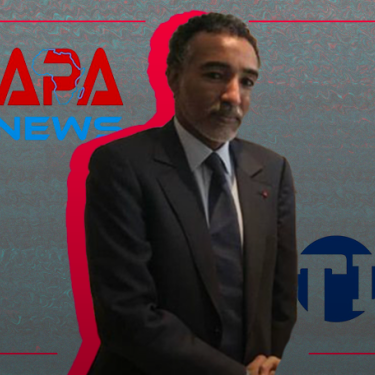Chad: RSF condemns the misuse of a US law to censor media outlets

Chad's leading news website was suspended for four days and several media outlets have been forced to withdraw articles after a former presidential adviser misused a US law to his advantage. Reporters Without Borders (RSF) condemns this fraudulent act and calls on the authorities to react to this type of blatant dishonesty.
In Chad, a former presidential adviser, businessman Abakar Manany, managed to censor a media outlet in order to erase the traces of his dismissal in July 2023. The news website Tchadinfos.com, the country's leading private media outlet, was inaccessible between from 26 to 29 July as Manany lodged a complaint with the site’s host, located in the US, claiming the site had illegally reprinted content.
“Abakar Manany started a blog where he copied and pasted all the [Tchadinfos] articles about him. He then contacted our host, based in the United States, through his lawyer, claiming that we had plagiarized content from his blog, which, although untrue, led to the suspension of our site," explained Tchadinfos general director Mamadou Djimtebaye. Manany was misusing the Digital Millennium Copyright Act (DMCA), a US law adopted in 1998, which obliges website’s hosts to suspend a news site when a complaint is lodged until the offending content has been removed or evidence to the contrary has been presented.
Since March 2024, Manany had asked several media outlets to remove articles that had been published about him, and Tchadinfos refused his request. The news site had covered several stories linked to Manany when he was presidential adviser, including his dismissal.
When politicians or businessmen like Abakar Manany are able to circumvent the law by using blatantly deceitful tactics to censor verified information and suspend an online media outlet, a dangerous precedent is set. In order to erase all traces of his previous political activities as an elite decision-maker for Chadian state, Abakar Manany has clearly violated the right to information by misusing the US Digital Millennium Copyright Act. RSF calls on the Chadian authorities to speak out against this dishonest and outrageous scheme, and to protect the practice of journalism.
At least five other media — Le Pays, Le N'Djam Post, N'Djamena Actu, Tchad One and the African Press Agency (Apanews) — received formal notices from Manany. All five decided to delete the articles in question so that their sites would not be blocked. The editorial coordinator of Apanews, Abdou Khadr Cissé found an Apanews article on Abakar Manany's blog that left the media's signature. “We decided to put the article on hold while the Americans checked the information we had sent,” said Cissé .
Direct threats to media workers
On 29 July, Manany went so far as to directly threaten the president of the Chad Online Media Association (AMET), Bello Bakary Mana, over the phone. “He told me that he was going to make my stay abroad a living hell, that I was going to see what he was capable of,” said Mana, who had been quick to support Tchadinfos. Manany had also targeted Djimtebaye three days earlier, threatening to cause him “all the trouble in the world”, starting with “blocking his visa” to France, where Djimtebaye regularly travels.
Manany became diplomatic adviser to the late President Idriss Déby Itno in 1993, and became a key go-between for the French and Chadian governments in the 2000s. He severed his relationship with President Déby in 2008 and after Déby's death in 2021, Manany resumed his role as presidential advisor — before being dismissed in July 2023 — with the transitional president, Mahamat Idriss Déby, who succeeded his father.
